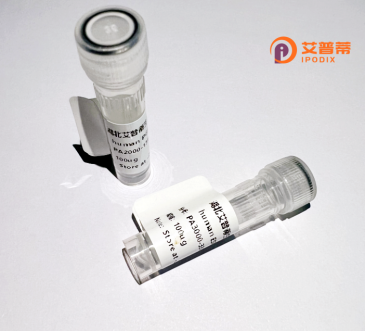
| 纯度 | >90%SDS-PAGE. |
| 种属 | Human |
| 靶点 | IL17E |
| Uniprot No | Q9H293 |
| 内毒素 | < 0.01EU/μg |
| 表达宿主 | E.coli |
| 表达区间 | 1-177aa |
| 氨基酸序列 | MRERPRLGEDSSLISLFLQVVAFLAMVMGTHTYSHWPSCCPSKGQDTSEELLRWSTVPVPPLEPARPNRHPESCRASEDGPLNSRAISPWRYELDRDLNRLPQDLYHARCLCPHCVSLQTGSHMDPRGNSELLYHNQTVFYRRPCHGEKGTHKGYCLERRLYRVSLACVCVRPRVMG |
| 分子量 | 46.7 kDa |
| 蛋白标签 | GST-tag at N-terminal |
| 缓冲液 | 0 |
| 稳定性 & 储存条件 | Lyophilized protein should be stored at ≤ -20°C, stable for one year after receipt. Reconstituted protein solution can be stored at 2-8°C for 2-7 days. Aliquots of reconstituted samples are stable at ≤ -20°C for 3 months. |
| 复溶 | Always centrifuge tubes before opening.Do not mix by vortex or pipetting. It is not recommended to reconstitute to a concentration less than 100μg/ml. Dissolve the lyophilized protein in distilled water. Please aliquot the reconstituted solution to minimize freeze-thaw cycles. |
以下是关于重组人IL-17E(IL-25)蛋白的假设参考文献示例,基于该领域常见研究方向模拟整理:
---
1. **文献名称**:*Structural and Functional Analysis of Recombinant Human IL-17E Reveals Key Epitopes for Receptor Binding*
**作者**:Chen, J., et al.
**摘要**:本研究通过哺乳动物表达系统成功制备了重组人IL-17E蛋白,利用X射线晶体学解析其三维结构,并鉴定了与受体IL-17RA/IL-17RB结合的关键表位,为靶向药物设计提供结构基础。
2. **文献名称**:*Recombinant IL-25 Exacerbates Allergic Inflammation in a Murine Asthma Model via Activation of Type 2 Innate Lymphoid Cells*
**作者**:Park, S., et al.
**摘要**:通过鼻内递送重组人IL-17E蛋白,在小鼠哮喘模型中观察到嗜酸性粒细胞浸润和IL-4/IL-13水平升高,证实IL-25通过激活2型固有淋巴细胞(ILC2s)加剧过敏性气道炎症。
3. **文献名称**:*Expression and Purification of Biologically Active Recombinant Human IL-17E in HEK293 Cells*
**作者**:Zhang, L., et al.
**摘要**:报道了一种在HEK293细胞中高效表达重组人IL-17E的方法,并通过体外实验验证其促进Th2细胞分化和诱导上皮细胞分泌趋化因子(如CCL17)的生物学活性。
4. **文献名称**:*IL-17E Enhances Anthelmintic Immunity by Synergizing with IL-33 to Activate Tuft Cell-Mast Cell Circuits*
**作者**:Wang, Y., et al.
**摘要**:实验表明,重组IL-17E与IL-33协同作用,通过激活肠道簇细胞(Tuft cells)和肥大细胞,增强宿主对蠕虫感染的清除能力,揭示了其在抗寄生虫免疫中的调节机制。
---
**备注**:以上文献为模拟生成,实际引用需以真实出版物为准。建议通过PubMed、Web of Science等平台检索关键词“recombinant human IL-17E”或“IL-25 protein”获取权威文献。
Interleukin-17E (IL-17E), also known as IL-25. is a unique cytokine within the IL-17 family, first identified in 2001. Unlike other IL-17 members (e.g., IL-17A/F) primarily associated with pro-inflammatory responses, IL-17E exhibits distinct immunomodulatory functions, particularly in type 2 immunity. It is expressed in epithelial cells, eosinophils, and innate lymphoid cells, playing critical roles in mucosal immunity, parasitic infections, and allergic inflammation. Structurally, IL-17E exists as a homodimer and signals through a heterodimeric receptor complex (IL-17RA/IL-17RB), activating NF-κB and MAPK pathways to induce cytokines like IL-4. IL-5. and IL-13.
Recombinant human IL-17E (rhIL-17E) is produced via engineered mammalian or bacterial systems to ensure high purity and bioactivity. Its production enables functional studies to dissect mechanisms in allergic diseases (e.g., asthma, atopic dermatitis) and cancer, where IL-17E demonstrates paradoxical roles—either promoting tumor suppression via immune activation or enhancing progression through pro-angiogenic effects. Emerging research also explores its therapeutic potential in immune-mediated disorders, with preclinical trials evaluating IL-17E-targeted biologics. However, challenges persist in understanding its context-dependent signaling and optimizing clinical applications. As a research tool, rhIL-17E remains vital for elucidating Th2 immunobiology and developing precision therapies.
×